In the third installment of this summer's "Leading Voices in Foreign Policy" lecture series, Fallon discussed the past and future of United States foreign policy in the Middle East on Thursday afternoon in Moore Theater. In his more than four decades of experience in the United States Armed Forces, Fallon has spent time in numerous countries, including Vietnam, Iraq and Bosnia. His most vivid experiences in life have always revolved around people, he said.
The Middle East's enormous wealth of natural resources, including more than half of the oil and natural gas reserves in the world, has made it a central topic of discussion and concern on the United States' economic, security and political agendas.
High levels of energy consumption in the United States, Western Europe and Japan bolstered the Middle East's economy in the 20th century.
The recent economic development and industrialization in India and China have also kept demand high, according to Fallon. Focus on oil futures in economic markets has further contributed to high prices, he said.
The United States has had a robust maritime presence in the Middle East since the end of World War II, according to Fallon. All the energy exports are transported by sea, and the potential choke points the points of most controversy in these trade patterns are located at ports, Fallon said. He also emphasized the complexity of policy issues in the Middle East, strongly warning against generalizations and oversimplifications, which can obscure regional issues.
Competing religious and ethnic groups make for a complex demographic in the region, Fallon said.
"Many of the radicals who caused pain [in the Middle East] are the same individuals or groups who we supported in Afghanistan in their struggle to resist the Soviets," he said.
Fallon said that the physical environment of the Middle East contributed to the conflict that has plagued the region for so many years, citing the "absolute absence of sound that envelops the senses like a shroud" to describe the harsh physical environment.
He emphasized that an appreciation of the environment is essential to understanding the people and cultures of the Middle East. Indonesia is the country with the most Muslims in the world, yet has historically experienced much less conflict than the Middle East, he said.
As he discussed these geopolitical issues in the context of the 21st century, Fallon focused on three main issues concerning U.S. policy in the Middle East the Arab Spring, Iran's efforts to secure nuclear weapons and the ongoing conflict between Israel and Palestine.
Turning toward current United States involvement in the Middle East, Fallon said good domestic policy is crucial to good foreign policy. In order to "promote righteousness abroad," the United States must focus on debt reduction, primary and secondary education and holding elected officials to high standards, according to Fallon.
"The Middle East needs today more than anything U.S. leadership," Fallon said.
Through reasoned, thoughtful engagement, the United States can be a "beacon of freedom" for the region and for the world, he said.
Students attending the lecture had varying reactions to Fallon's perspective on the Middle East. The majority of Dartmouth students at the lecture attended as part of the government class associated with the Leading Voices lecture series, Leading Voices in Foreign Policy, and had the opportunity to talk to Fallon during class before the lecture.
"He didn't really outline specific policies he would advocate," Sophie Choi '14 said. "He spent most of his time discussing theories and ideologies, but didn't spend much time on the practical problems or possible solutions."
Other students were skeptical of Fallon's appreciation and respect for the cultures of the Middle East.
"His perspective was interesting in that it takes a very sort of simplistic view it's very black and white," Angie Dylgjeri '14 said. "There was a slight lack of cultural sensitivity, with instead a point of view that there are things that need to be implemented, and whatever we decide is the best foreign policy option."
Griffin Adams '14 found Fallon's focus on trust and principle in guiding decision-making "surprising for a military man."
"I thought Admiral Fallon echoed the sentiments of many of the students and professors in calling for a more restrained, maritime over-the-horizon approach to Middle East foreign policy," Adams said.
Fallon's lecture, titled "Shifting Sands: U.S. Interests and Policy in the Middle East" was sponsored by the Office of the President. The next lecture in the series will be given by Todd Stern '73, special envoy for climate change at the State Department, on Aug. 2.




